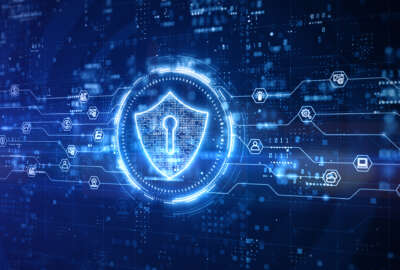How to develop the cyber warfare leaders the military needs
The armed services need to expend their numbers of high-ranking cybersecurity and cyber warfare officers.
Best listening experience is on Chrome, Firefox or Safari. Subscribe to Federal Drive’s daily audio interviews on Apple Podcasts or PodcastOne.
The armed services need to expend their numbers of high-ranking cybersecurity and cyber warfare officers. The next guest on the Federal Drive with Tom Temin says the place to do that is at the war colleges, because right now there’s not enough educational capacity in the military. Alfredo Rodriguez is senior analyst to the Marine Corps deputy commandant for information, and a retired Army signal lieutenant colonel.
Interview transcript:
Tom Temin: Mr. Rodriguez, good to have you on.
Alfredo Rodriguez: Good morning, Tom.
Tom Temin: So tell us more about your thesis. You are stationed now or working now out of one of the war colleges. And you have this idea that they need to expand their cyber offerings for people, colonel, lieutenant colonel, general, captain that type of level?
Alfredo Rodriguez: Yes, sir. So I always start with the asterisk part. You know, everything I say is, of course, my own opinion, not of the DoD or the Marine Corps. But I think now more than ever, the Department of Defense needs simply trained senior officers that have that technical and strategic education to confront the current challenge. The department is doing very well on developing skilled people in the junior and uniform ranks. But this is insufficient. I think to prepare the next generation of senior executives, senior cyber leaders, the war colleges to start, that’s where you should start, and they have the capacity to do it.
Tom Temin: And top level civilian officials also attend these colleges as well as uniformed officers, correct?
Alfredo Rodriguez: Correct. I am at the war college right now as a GS-14. And so the war college is unique. You get to see civilians, you know, from State Department, Department of Defense, and aspiring colonels and generals all in the same place, studying national security.
Tom Temin: Because if you look at the intake ranks at the military, there is constant programs to make sure the ROTC programs or the training that they get early on in their careers and military careers include a choice of cyber, and there’s incentives to hire cyber people or to have them enlist in the uniformed services. But is that kind of where it tends to run out, then?
Alfredo Rodriguez: Correct. But that’s the build, you know, you build your cyber lieutenant and he becomes a cyber captain, he becomes a cyber major. And they’re constantly getting, you know, the influx, they’re getting training, their understanding the operational and tactical level. But then when you get to the senior war college portion, right now, only the College of Information and Cyberspace at the National Defense University has a dedicated program. But that’s exclusive to a select few of uniformed civilian leaders who get to attend, right? There’s that college, the Air Force, the Navy, the Marine and the Army one. So if you start doing the numbers, you’re getting an exclusive few. This convergence, this is why we gotta get that across all the war colleges.
Tom Temin: In other words, there’s five times as many institutions that could offer this type of training than actually do now.
Alfredo Rodriguez: Yes, sir.
Tom Temin: And what are the areas of knowledge that would be required for someone high level that’s not maybe necessarily going to be pushing the buttons on the keyboards of the cyber operators?
Alfredo Rodriguez: I posed in the article and in the greater one that I’m working with the war college, I felt there were five areas where senior cyber strategic leader should be applying military operations. And the first is the senior leader applies or evaluates the national security environment as a whole, and understands how cyber operations apply to all instruments of national power. And that’s kind of where the colonels and generals operate. They have to understand how to integrate cyberspace in the joint doctrines, perspectives, because that’s how we fight. You know, in growing up in cyber, of course, one of the aspects of the technology that theory is law, which is very difficult in how that applies to national strategy. Senior leaders at the graduate level do risk. So they understand how to mitigate vulnerabilities in risk and joint operations. And finally, a senior leader understands how to apply the principles of decision making and ethical conduct. So those five things is what I have proposed. I’m trying to get the conversation started with the war colleges, what senior cyber leadership should should be able to apply.
Tom Temin: We’re speaking with Alfredo Rodriguez. He’s a civilian analyst to the Marine Corps Deputy Commandant for Information. He’s also a retired Army officer, and you are now attending the Air War College.
Alfredo Rodriguez: Yes, well rounded.
Tom Temin: Well rounded gentleman for sure. And talk more about the ethical decision making that would be required of cyber operators at a high level. I mean, we’re seeing highly unethical kinetic operations going on in Ukraine right now, the deliberate targeting of civilians and so forth. What does this mean in the cyber context?
Alfredo Rodriguez: I mean, I would say it’s an understatement to say that the introduction of cyberspace as a domain has had disruptive effects across all warfighting domains, which we’re seeing. So as a war college I’m obligated to quote Clausewitz, right. And that’s what we do. So all planning, strategic planning must pay attention to the character of contemporary war, which is what you discussed. And cyber is an information related capability. It’s critical that systems overmatch and ensuring a prevailing message as an informational instrument of power. It permeates all phases of campaigning, strategic competition and conflict, its employment, its risk, its innovation is serious. And so this is why at the higher level, those senior leaders and advisers in cyberspace will help shape that domain, as you’re using it in hybrid warfare and what you’re seeing today in the news.
Tom Temin: Because in the other domains of warfare, air power and land power, and so forth, the United States for many years, maybe not so much at the moment, but for a number of decades had strategic advantages, specific technical capabilities that could not be matched by any enemy force in the world. But in cyberspace, it’s almost utterly democratic. Everybody has the same tools and techniques. So what leads to a strategic offset, if you will, in cyber?
Alfredo Rodriguez: You know, disruptive technology is what we call it, it enables the smallest entity the capacity to do and introduce complexity. So no longer are we looking on state on state, you know, on the radar, the good folks in CYBERCOM have to look across the broad spectrum, you know, for individual actors, and so forth. And so you can see why senior leaders critical at this junction of where to take risks, where to put the operation, where to weigh things. And this is why I’m asking for that higher level to be introduced.
Tom Temin: It’s almost like you need chess skill, because the other side has the same pawns and rooks and queens and kings, as you do.
Alfredo Rodriguez: Yeah. And what they don’t have is all instruments of power. And so, you know, the diplomatic information, as I discussed, which is critical military and economic. And so having a senior cyber leader who can weigh in on how cyber operation affects all four instruments of power, it’s how we outweigh that advantage,
Tom Temin: Right, because cyber is inherent to all the other instruments of power, because they’re all, just to put it basically, controlled by software.
Alfredo Rodriguez: And data and information, yes. And which is why you’ll see that particularly in the Marine Corps, why they’re weighing heavily on information and how it provides system overwatch and a prevailing message and resiliency.
Tom Temin: And what about the cultural aspects of this because reaching high levels in the military and commanding respect at that level, often comes with having had the kinetic background, if you will, the go boom background, but this is something that goes click.
Alfredo Rodriguez: Yes. And you know, so we say that culture eats strategy for breakfast, and twice on Sunday, right? And that’s what we’re asking senior leaders to do. So the DoD in doing doctrine has done very well is declaring cyber as a warfighting domain. So that was step one. Once you do that, you can start the right leaders. This happened earlier in my career, IT was just coming of age. But once the warfighter sees how critical it was, the S-6s became a lot more important. That will happen with cyber as well. And so you can see the services starting to move towards that the two six combination. And of course, the Marine Corps with the Deputy Commandant preparation.
Tom Temin: And have you gotten any signals from the war colleges that they might be amenable to this idea?
Alfredo Rodriguez: A lot of discussion at the Air War College, I know that they have, and I’ve wrote an article, they have the capacity there because they have the Air Force Institute of Technology. They’ve stood up an Air War College, they’re progressing to move forward. And I’ve had some LinkedIn conversations with the Army Center of Excellence. I think they understand this. It’s just about getting the momentum going. That’s what I’m hoping the article was was to get the conversation introduced a couple of ideas to get the momentum going. And I think what’s happening real world will also drive some effect there.
Tom Temin: Alfredo Rodriguez, civilian analyst to the Marine Corps Deputy Commandant for information. Thanks so much for joining me.
Alfredo Rodriguez: Tom, It was great talking to you this morning.
Copyright © 2025 Federal News Network. All rights reserved. This website is not intended for users located within the European Economic Area.
Tom Temin is host of the Federal Drive and has been providing insight on federal technology and management issues for more than 30 years.
Follow @tteminWFED






